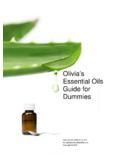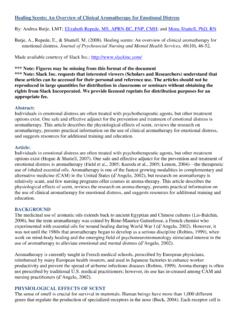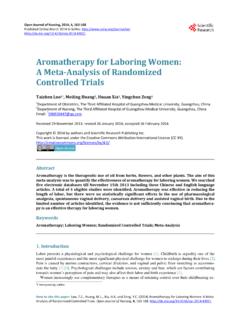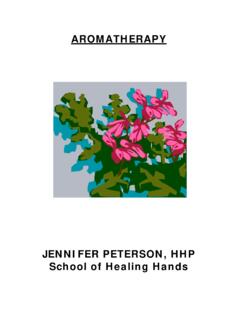Transcription of STEPHEN BENT, MD San Francisco, Calif Treatment or ...
1 188 2000 American College of Physicians American Society of Internal Medicine EDITORIALSTEPHEN bent , MDSan francisco VA Medical CenterSan francisco , CalifEff Clin Pract. 2000;4:188-190 This paper is available at : IneffectiveTreatment or EffectivePlacebo?The smell of apple pie may trigger a smile, and a whiff of formaldehyde mayevoke memories of the anatomy lab, but can smell actually help patients? Theoften-overlooked second cranial nerve does have some interesting molecules arrive at the nose, the olfactory bulb is stimulated and it sends sig-nals to the limbic system, including the amygdala, which governs certain smells elicit pleasant responses, it is not too great of a leapto imagine that they might also lead to decreased anxiety, pain, or refers to the practice of giving patients essential plant oils tosmell.
2 Essential oilsare steam distillates obtained from aromatic plants. 1 Essentialoils differ from other kinds of oils ( , cooking oils) because they have low boilingpoints and therefore evaporate quickly to produce an aroma. When used therapeuti-cally, the oils may be placed on a cloth near a patient, put in a bowl of hot water toproduce a steam, or administered by mist from a nebulizer or often use massage in association with the odors. (As there are cur-rently no licensing standards in the United States, anyone can call himself or herselfan aromatherapist2).Although aromatherapy has been used for centuries, there are few high-quali-ty randomized, controlled trials examining the efficacy of this Treatment . Most stud-ies have used single-arm, before-and-after comparisons ( , Patients were given apleasant smell and reported feeling better afterwards ).
3 These types of studies are notparticularly helpful because almost any Treatment without side effects is likely to pro-duce a beneficial response, either due to a placebo effect or some aspect of the inter-vention. Although it could be argued that aromatherapy has no side effects andshould therefore be given to all patients, any efforts to provide this therapy coulddetract from the use of other, potentially more beneficial treatments. Furthermore, aromatherapy can be expensive. Studies are clearly needed to determine if aroma-therapy is beneficial and whether its effects are comparable to those of other conven-tional and complementary this issue of ecp, Wiebe reports the results of the first randomized, con-trolled trial to examine the effect of aromatherapy on preoperative trialis refreshingly simple and complete.
4 Patients awaiting surgical abortion were ran-domly selected to sniff a blend of essential oils believed to reduce anxiety or to sniffa pleasant-smelling hair conditioner. Anxiety was assessed before and after thearomatherapy with a 10-point anxiety scale. Both groups of patients showed about a1-point decrease in anxiety score, and there was no difference between groups. Theessential oils were no more effective than the hair with any negative study, it is reasonable to question whether this study hadsufficient power to detect a difference, if one was present. In this case, the authorsnote that the study had an 80% power to detect a 1-point difference in anxiety scoresbetween groups. A power of 80% is standard, and differences less than 1-point onthis anxiety scale seem to be clinically power calculations are more germane when planning studies; when a studyis complete, the best way to scrutinize a negative study is to examine its confidenceinterval.
5 The confidence interval provides a range of values over which the true Effective Clinical Practice July/August 2000 Volume 3 Number 4189value (in this case the difference in anxiety scorebetween groups) is most likely to occur. If a confidenceinterval is very wide and includes clinically importantvalues, then the negative study has not effectively ruledout important effects of the Treatment . In this case, theconfidence interval is very small: to ; thus, it isunlikely that the Treatment has any substantial positiveor negative pleasant aromas ineffective for reducing pre-operative anxiety? Not necessarily. This study only tellsus that essential oils are no more effective than hair con-ditioner. Both groups showed a 1-point reduction inanxiety scores, an amount that may be clinically impor-tant.
6 Who would not want to have a little less anxietybefore an operation? The observed reduction in anxietycould have been caused by the aromas or may have beendue to some other aspect of the intervention or outcomeassessment. Perhaps anxiety was reduced by the practiceof sitting quietly for a brief period of time or by the shorttalk with the study assistant. Or maybe it truly was stim-ulation of the olfactory nerve by both pleasant odors thatled to the small reduction in whether either of the two treat-ments (essential oils and hair conditioner) were betterthan no Treatment at all would require a third, no-inter-vention study arm. In this arm, patients could simplyhave their anxiety scores measured at the two timepoints before the procedure. If the anxiety scoresimproved by 1 point in this no-intervention group, thenit would be possible to conclude that both the essentialoils and the hair conditioner were completely ineffec-tive.
7 The 1-point improvement in each group mightthen simply reflect the natural history of the anxietyexperienced in this setting (or some bias in the assess-ment of the outcome measure).The Wiebe study3raises a general question for trialsof complementary and alternative medicine: What are theright control groups? Table 1outlines several ways thata control group might be conceived. One approach is tosufficiently mimic active Treatment so that blinding occurs(as was done in the Wiebe study). When the controlgroups become elaborate enough to blind patients, how-ever, the control treatments may actually become example, acupuncture trials often involve the creationof a control sham-acupuncture intervention. In thesham-acupuncture group, patients relax on an acupunc-ture table and have an acupuncturist pretend to insert nee-dles (or in some cases, insert needles into the wrong spots).
8 Control groups in trials of massage or energy healing mayalso share some of the benefit of the active Treatment . Athird, no-intervention arm would allow investigators todetermine whether any observed benefits in the controlgroups were better than doing nothing at potential control group could be designedto control for practitioner time. Many complementaryand alternative medicine treatments require the practi-tioner to spend a great deal of time with the have speculated that it is not the therapy itself butmerely the increased time with a caring person thatleads to improved outcomes. In the current study, forexample, the study assistant may have been a very caringperson and may have eased the anxiety of all patients,regardless of whether they sniffed the pleasant odor.
9 Ifthis is a concern, a control group could be incorporatedinto a future study whereby the study assistant couldspend an equal amount of time in comparison with theother groups but without offering any and alternative medicine studiesare more complicated than placebo-controlled, random-ized trials of pharmaceutical agents. As the control groupsTABLE 1 Possible Study Arms for Trials of Complementary and Alternative TherapiesSTUDY ARMA ctive treatmentControl groupsSham Treatment Time No interventionDESCRIPTIONThe clinical Treatment of interest ( , thestrategy being evaluated in the trial)Intended to mimic the Treatment of interestto facilitate blindingEqual time with a caring person, but noattempt to mimic treatmentGives insight into the natural history of theconditionAROMATHERAPYS niff the essential oilSniff hair conditionerEqual time with thestudy assistantData collection onlyACUPUNCTUREA cupuncture withacupuncturistSham needles withacupuncturistEqual time with anacupuncturistData collection onlyEXAMPLES Effective Clinical Practice July/August 2000 Volume 3 Number 4190become more complex, it may be necessary to create sever-al control groups in which different aspects of the inter-vention are examined.
10 Given the complexity of comple-mentary and alternative medicine studies, an extra helpinghand (or arm) may allow investigators to determine whichaspects (if any) of the treatments are truly J. Use of aromatherapy as a complementary treatmentfor chronic pain. Altern Ther Health Med. 1999;5 NJ. Scents or nonsense: aromatherapy s benefits stillsubject to debate. J Natl Cancer Inst. 1997;89 E. A randomized trial of aromatherapy to reduce anx-iety before abortion. Eff Clin Pract. 2000;4:166-169. CorrespondenceStephen bent , MD, Department of Internal Medicine, San francisco VA Medical Center, Osher Center for IntegrativeMedicine, 4150 Clement Street, 111A1, San francisco , CA 94121; telephone: 415-750-2093; fax: 415-386-4044.









